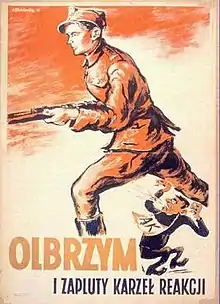Propaganda in the Polish People's Republic
Communist propaganda played an important role in the Polish People's Republic, one of the largest and most important satellite states of the Soviet Union following WWII. Together with the use of force and terror it was instrumental in keeping the country's communist government in power and was designed to shape Polish society into a communist one.[1]

The language of Poland's communist propaganda was extremely violent, as with many others like in communist nations. All those who disagreed with the voice of the Polish United Workers' Party were dubbed as "fascists" and "reactionary thugs". For example, already towards the end of World War II, political officers (similar to Soviet political commissars in the Soviet Red Army) in the Soviet-backed Polish Army received specific guidelines for the training of their soldiers, ordering them to refer to all anti-Nazi resistance on Polish lands – other than those they allied with or similarly communist – as the "bastards of the NSZ and AK," and "Hitler’s emulators".[2] The insurgents of anti-German uprisings (such as at Warsaw and in the city's Jewish ghetto) became synonymous with "bandits,", "traitors,", "anti-Semites" and "Jew-killers." Since 1944, the Polish communist propaganda campaigns were usually followed by jarring abuses of human rights and the application of physical, mental and psychological torture in the communist legal system.[2]
Starting from the 1970s, Polish propaganda was significantly altered and then dominated by the form known as "propaganda of success".
See also
References
- Wojciech Roszkowski, Najnowsza historia Polski 1914-1945. Warszawa: Świat Książki, 2003, p. 236-240, 678-680, 700-701. ISBN 83-7311-991-4.
- Marek Jan Chodakiewicz, "The Legal Basis of Torture and the Communist Propaganda", in The Dialectics of Pain: The Interrogation Methods of the Communist Secret Police in Poland, 1944-1955. Glaukopis, vol. 2/3 (2004-2005).
External links
- (in Polish) Propaganda w PRL-u
- (in Polish) Internetowe Muzeum Polski Ludowej
- (in Polish) Komunizm, socjalizm i czasy PRL-u
- (in Polish) Propaganda komunistyczna
